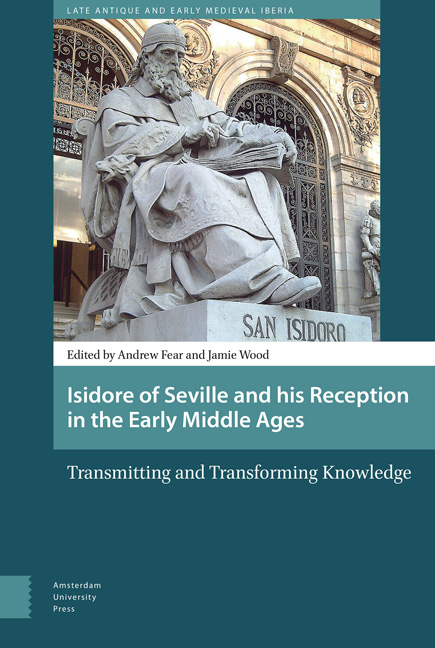 Isidore of Seville and his Reception in the Early Middle Ages
Isidore of Seville and his Reception in the Early Middle Ages Book contents
- Frontmatter
- Contents
- Preface: Paul Fouracre, University of Manchester
- 1 Introduction
- 2 A Family Affair: Leander, Isidore and the Legacy of Gregory the Great in Spain
- 3 Variations on a Theme: Isidore and Pliny on Human and Human-Instigated Anomaly
- 4 Putting the Pieces Back Together: Isidore and De Natura Rerum
- 5 The Politics of History-Writing: Problematizing the Historiographical Origins of Isidore of Seville in Early Medieval Hispania
- 6 Isidorian Texts in Seventh-Century Ireland
- 7 Isidore of Seville in Anglo-Saxon England: The Synonyma as a Source of Felix’s Vita S. Guthlaci
- 8 Hispania et Italia: Paul the Deacon, Isidore, and the Lombards
- 9 Rylands MS Latin 12: A Carolingian Example of Isidore’s Reception into the Patristic Canon
- 10 Adoption, Adaptation, & Authority: The Use of Isidore in the Opus Caroli
- Abbreviations
- Index
2 - A Family Affair: Leander, Isidore and the Legacy of Gregory the Great in Spain
Published online by Cambridge University Press: 12 December 2020
- Frontmatter
- Contents
- Preface: Paul Fouracre, University of Manchester
- 1 Introduction
- 2 A Family Affair: Leander, Isidore and the Legacy of Gregory the Great in Spain
- 3 Variations on a Theme: Isidore and Pliny on Human and Human-Instigated Anomaly
- 4 Putting the Pieces Back Together: Isidore and De Natura Rerum
- 5 The Politics of History-Writing: Problematizing the Historiographical Origins of Isidore of Seville in Early Medieval Hispania
- 6 Isidorian Texts in Seventh-Century Ireland
- 7 Isidore of Seville in Anglo-Saxon England: The Synonyma as a Source of Felix’s Vita S. Guthlaci
- 8 Hispania et Italia: Paul the Deacon, Isidore, and the Lombards
- 9 Rylands MS Latin 12: A Carolingian Example of Isidore’s Reception into the Patristic Canon
- 10 Adoption, Adaptation, & Authority: The Use of Isidore in the Opus Caroli
- Abbreviations
- Index
Summary
Gregory
Hippo, as much as you are distinguished for your teacher Augustine, So much is Rome for its Pope Gregory
Leander
You are held to be not much unequal to the ancient Doctors, Leander the Bishop: your works teach us this
Gregorius
Quantum Augustino clares tu Hippone magistro Tantum Roma suo praesule Gregorio
Leander
Non satis antiquis doctoribus impar haberis Leander vates hoc tua dicta docent
Introduction
There is no doubt that Pope Gregory I (r. 590-605) had a deep and lasting impact on the religious life of early medieval Spain. It would be easy, with the benefit of hindsight, to look back from Gregory's status as one of the fathers of the Latin Church and see this as an inevitable outcome of his exemplary life and work in organising the papacy and sending missions to the Anglo-Saxons. Yet, his memory was by no means uncontested in Rome in the decades after his death and no hagiography was authored there until the ninth century. A famous Life of Gregory was written at Whitby in northern England around the year 700 which drew on interest in his cult in later seventh century England, Ireland and Gaul, as well as Rome. This chapter will demonstrate that beginning in the first decade of the seventh century, Gregory's status as a Father of the Church was actually established more quickly and maintained more solidly in Spain than elsewhere in Latin Europe.
The verse above, by Isidore of Seville (d. 636), is thus the first bloom of the Gregorian legacy in seventh century Spain. The extremely positive view of Gregory was not solely the result of his position as bishop of Rome, however. Relations between the papacy and the bishops and kings of seventh century Spain were infrequent and often fractious, so the memory of Gregory cannot be attributed solely to royal or papal initiative. Although there had been ecclesiastical contacts between Rome and Spain throughout late antiquity, such interactions had never been intense, at least insofar as they can be pieced together from the surviving evidence. This chapter will argue that Gregory's popularity in the early seventh century was due to his connection to Leander of Seville and thus to his brother Isidore of Seville.
- Type
- Chapter
- Information
- Isidore of Seville and his Reception in the Early Middle AgesTransmitting and Transforming Knowledge, pp. 31 - 56Publisher: Amsterdam University PressPrint publication year: 2016
- 2
- Cited by


